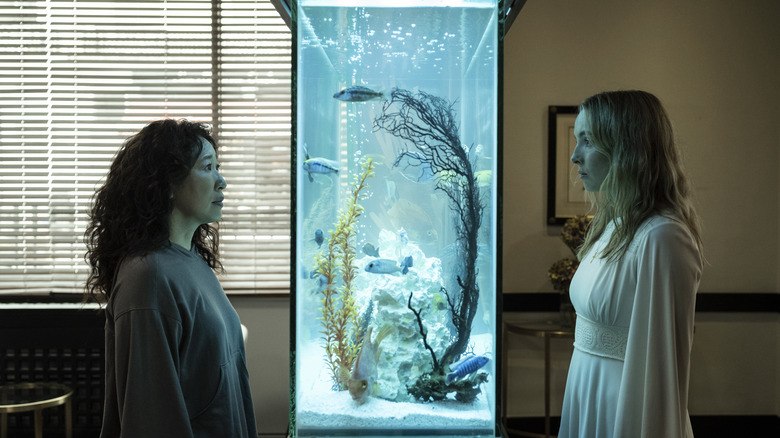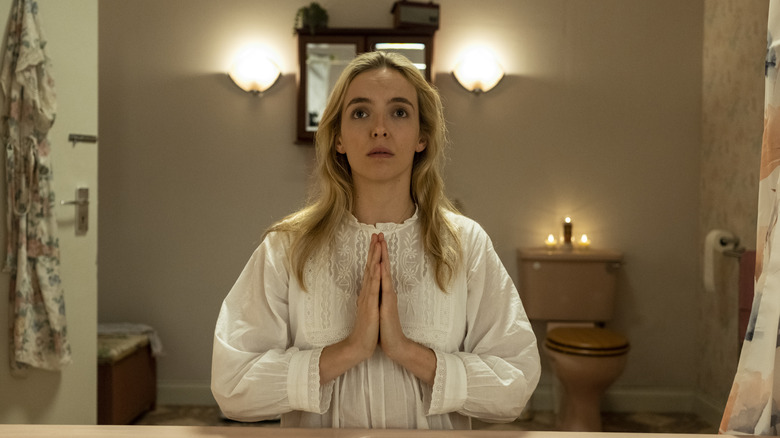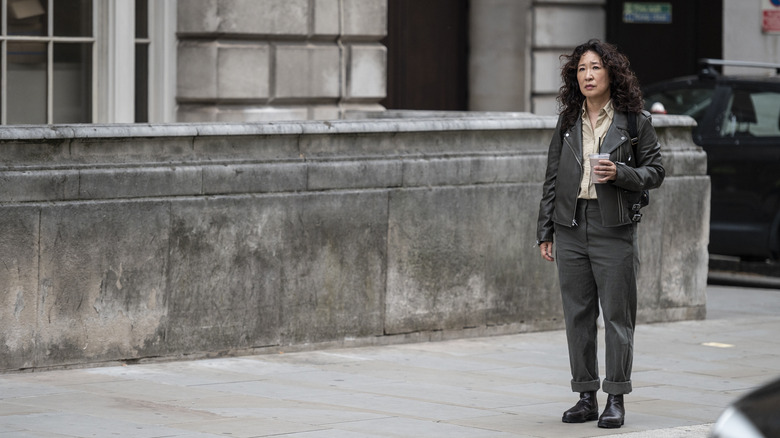
The final season of "Killing Eve" faces a rather monumental task: can it even come close to recapturing what made the series so special in the first place? The show's first season had the benefit of Phoebe Waller-Bridge serving as head writer, and it arrived feeling fresh and exciting (and more than a little twisted). That first season introduced us to MI5 analyst Eve Polastri (Sandra Oh) and psychopathic assassin Villanelle (Jodie Comer). The two women seemed like complete opposites — Eve was fussy, meticulous, and, if we're being honest, painfully normal. Villanelle was wild and vibrant (and, yes, a murderer). The characters were also on opposite sides of the law, with Eve essentially tasked with bringing Villanelle down.
And yet, despite their differences, or perhaps because of them, Eve and Villanelle were drawn to each other. That first season perfectly encapsulated the unhealthy (but narratively appealing) obsession growing between the duo. Were they in love? In lust? Was Eve just as demented as Villanelle? There were no easy answers, and that was all part of the fun. Unfortunately, the seasons that followed never quite managed to recapture the initial magic. Season 2 was a bit of a step-down, but signs of promise poked through. Season 3, however, muddled things, building an increasingly uninteresting conspiracy and introducing all sorts of supporting characters who couldn't hold a candle to Eve or Villanelle.
The problem with "Killing Eve" as a whole is that the show has to essentially reset itself every season. No matter how close Eve and Villanelle grow during the course of a season, the show's formula requires them to be at odds again by the time the new season begins. After all, how many great shows went downhill after they answered the "will they or won't they?" question. "Moonlighting" lost its spark when David Addison and Maddie Hayes hooked up. Sam and Diane getting together on "Cheers" backfired. And after years of sexual tension, the inevitable romance between Mulder and Scully on "The X-Files" was a disappointment. It stands to reason, then, that having Eve and Villanelle finally fall into each other's arms would hinder the show (never mind the fact that the relationship itself is toxic as hell, there's no argument there – but c'mon, we all know the prospect of the two of them getting together is what's driving this story).
Keeping Eve and Villanelle apart romantically makes sense to keep the story going, but keeping them apart in general also effectively torpedoes any progress the show made in previous seasons. Season 3 concluded with Eve and Villanelle standing back to back on a bridge with the implication that they could turn around and face each other, or walk in their separate directions. It felt like a real turning point in the relationship. But when "Killing Eve" season 4 begins, it's as if that fateful bridge scene never even happened. Once again, the show has reset itself. But at least we can take solace knowing that since this is the final season, it will be the last time we're forced to put up with one of these maddening resets.
The Scorpion And The Frog

After all that's happened to Villanelle and Eve, can either of them change? Both characters would like to hope so, or at least that's what they're telling themselves. Eve is no longer working for the government, and she swears she no longer cares about Villanelle. Instead, she's landed a gig at a private security firm alongside Yusuf (Robert Gilbert), her partner and occasional lover. Eve uses this new job in her quest to track down the Twelve, the mysterious and consistently vague organization that recruits and farms out assassins. Villanelle was once one of the Twelve's top operatives, but now she's out of the game. Or so she tells herself. She's found religion — or at least, she's trying to find religion. She's on the verge of receiving her first baptism. But it's all for show — she invites Eve to attend the ceremony, and when Eve doesn't show, Villanelle almost immediately abandons any religious pretexts (and starts killing again).
She tracks down psychopath expert Martin (Adeel Akhtar) and tries to undergo therapy. "I don't like the way I feel," she tells him. "I feel like s**t, all of the time." She also says: "I'm a bad person who's trying to be good." But is she? Or is she just trying to impress Eve? When asked what she wants from Eve, Villanelle dreamily replies: "To smell her skin." She can't shake Eve off, and she doesn't seem to understand why.
As for Eve, when the subject of Villanelle comes up, she's quick to say that Villanelle is "not her job" anymore. And later, when she and Villanelle meet up again, she asks the assassin: "Do you know the story of the scorpion and the frog?" "They hook up?" Villanelle hilariously (and hopefully) offers. "No," Eve shoots back. "They both die, because the scorpion can't change." At which point, Villanelle turns things around by telling Eve: "Maybe you're the scorpion."
The interplay between Oh and Comer remains the highlight of "Killing Eve." Comer continues to have the flashier role (there's an episode here where we see her imagining herself as Jesus Christ, complete with a fake beard and shiny gold boots), but the subtle, quiet glances Oh delivers in nearly all her scenes are hypnotic. She does so much by saying so little. And the two performers still have great chemistry together, which just makes the show's insistence on keeping them apart all the more frustrating. I'm not saying "Killing Eve" needs to immediately throw caution to the wind and turn Eve and Villanelle into a full-blown couple. But it would be nice if the series found more ways to have Oh and Comer share the screen together more frequently. Instead, the series is content to have them off on their own side-quests while continually checking in with less-interesting characters.
Rainbows Surrounded By Beige

Characters like Carolyn Martens (Fiona Shaw), for instance. Once a bigshot at MI6, Carolyn has now been assigned to a desk gig at an embassy in Spain. Like Eve, she, too, wants to track down the Twelve, since they murdered her son last season. But she doesn't have the access she once enjoyed. While Fiona Shaw is a phenomenal performer doing good work here as she continues to play Carolyn as an icy, no-nonsense figure of authority, it's almost impossible to remain very interested in her character.
Ditto several other figures who keep getting prominence, including mysterious Twelve member Helene (Camille Cottin), and new character Pam (Anjana Vasan), a sociopathic mortician being scouted to join the organization. I have no doubt the stories involving these individuals will pan out in some way, but in the three episodes made available to critics, the characters are duds. At one point, Villanelle describes herself as a "rainbow surrounded by beige," and that's how things begin to feel in the season, too. Villanelle and Eve are bright figures surrounded by dull characters who fail to catch our interest.
With all this in mind, it's probably for the best that "Killing Eve" is ending here with season 4. I remain hopeful that the series will ultimately stick the landing and make the middling moments that proceeded it worthwhile. At the very least, I remain content that we were graced with such a lovely, twisted, memorable first season. And that we got to spend time watching Oh and Comer work their magic along the way. But in the end, it's felt as if "Killing Eve" has given us more beige than rainbows.
"Killing Eve" season 4 premieres Sunday, March 6, 2022, on AMC+ and Sunday, March 13, 2022, on BBC AMERICA.
Read this next: 15 Shows Like Brooklyn Nine-Nine You Need To See
The post Killing Eve Season 4 Review: Sandra Oh and Jodie Comer Remain Wonderful in a Series That Can't Recapture Its Initial Magic appeared first on /Film.
0 Commentaires